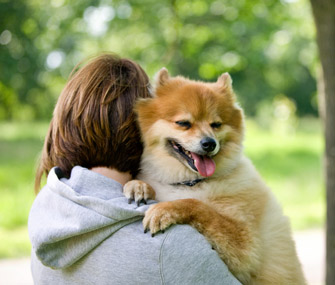Why Doesn’t My Dog… Like to Be Held?
Published on January 20, 2017
Skip To

But do dogs like it? To the dismay of many, no, they don’t always like it. Being held — which covers everything from a loving hug to a snuggle in your lap — can raise a dog’s stress level and cause him to show visible signs of anxiety.
When your puppy squirms when you pick him up, it’s not just because he’s being a wiggly puppy. Most dogs dislike being restrained — and who can blame them? But why is that?
Why Your Dog Isn’t a Hugger
There are several reasons a dog may resist your efforts to nestle his fuzz. Some are simply natural. In his April 13,
2016, Psychology Today column, Canine Corner, dog-loving psychology professor
Stanley Coren writes that dogs are “cursorial animals.” That means they are
designed to run fast. A dog’s first instinct in the face of danger is to run
away. And being held prevents him from doing that.It’s also possible that your dog has had a negative experience with a restraining hug. Think about it. Your dog may have been restrained at the veterinary clinic or groomer to make it possible to perform an exam or a procedure that the dog doesn’t like. Vaccinations, nail trims, having a thermometer inserted into his rear end — all of these procedures can be uncomfortable and unpleasant for dogs, and may cause them to associate hugs with those undesirable experiences.
Finally, your dog may dislike or be afraid of hugs from young children, who can be unintentionally rough with a dog. Toddlers can grab too hard, hold too tight and accidentally pull fur or ears or step on tails when they give a dog a hug. That’s why veterinarians and other dog experts everywhere advise parents not to let children hug dogs. It’s all too easy for a well-meaning hug to lead to a bite.
Know the Signs
What are the signals that your dog is unhappy being held? He may turn his head away, show the whites of his eyes (called whale eye) or pull his ears back against his head. Other signs of anxiety are lip licking and yawning. If you see your dog performing these behaviors, the message is clear: He’s not a happy camper.Between themselves, dogs show affection not by hugging or snuggling but by licking each other’s faces and then giving a good sniff to other parts of the body, including the all-important butt.
I always like to remind people that dogs are individuals. Some love to be cuddled, but it’s always a good idea to be sensitive to your dog’s preferences. If you force affection on him, he can become more reluctant to interact with you. Instead of a hug, you can show affection to your dog by scratching him behind the ears or on the chest, rubbing that sweet spot between the eyes or giving him a belly rub if that’s what he loves best.
Most important, pay attention to changes in your dog’s behavior. If he normally loves to be held and snuggled, take note if he suddenly resists being held. He could have a painful medical problem that’s causing the unusual behavior. Take him to your veterinarian for a once-over to make sure he has a clean bill of health.
More on Vetstreet:

